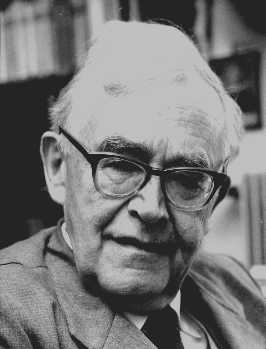Barth and McGrath
 In my last-but-one post I asked a question concerning the legitimacy of the charge made by McGrath against Barth’s Christology, i.e. whether it unhelpfully avoided the challenge of the relation between the ‘Christ of faith’ and the ‘Christ of history’ or not. In the comments, Ben Myers has provided a wonderful defence of the Barthian position and in this post I want to make my own suggestion in Barth’s defence. But before I start, I must admit that I’m, unlike Ben, no expert on Barth and my comments directly on his theology are based largely on second-hand opinions. Indeed, if I’ve missed the point in any of my comments then I’d appreciate being informed.
In my last-but-one post I asked a question concerning the legitimacy of the charge made by McGrath against Barth’s Christology, i.e. whether it unhelpfully avoided the challenge of the relation between the ‘Christ of faith’ and the ‘Christ of history’ or not. In the comments, Ben Myers has provided a wonderful defence of the Barthian position and in this post I want to make my own suggestion in Barth’s defence. But before I start, I must admit that I’m, unlike Ben, no expert on Barth and my comments directly on his theology are based largely on second-hand opinions. Indeed, if I’ve missed the point in any of my comments then I’d appreciate being informed.The very construction of ‘Christ of faith’ and ‘Christ of history’ was the meat and concern of protestant Liberal theology (Harnack, Ritschl etc.). And it was largely this that Barth reacted to in Romans, with the construction of dialectics that destroyed any chance of getting true Christianity from a focus on our religiosity in relation to the ‘Christ of history’. In a similar manner, one can recall the consistent eschatological school (e.g. Albert Schweitzer) who were destroying the liberal foundations of an interpretable ‘Christ of history’ into ‘faith’ categories.
However, in the light of his Romans dialetics, if Schleiermacher’s ‘Gefühl’ and the result’s of liberal protestant historical research could no longer carry the weight put on it, how, then, could one speak at all of God through Christ? Barth’s answer was to reorientate the dialect constructed in his earlier works around Christology (good chap!). Rather than trying to squeeze a view of the eternal through the small window provided by liberal historical reconstruction and critique, Barth turns the tables and insists that we are all part of the reality of Christ, or, to refer to the John Webster quotation used by Ben, ‘Our knowledge of Jesus Christ is ingredient within his reality, as the risen, ascended and self-communicative one’. Henceforth, it is possible to see Barth’s entire theological enterprise as largely a response to the ‘Christ of faith’/’Christ of history’ problem thrown up in German protestant liberalism, and the associated legacy of Schleiermacher.
Thus, with Robert Jenson, it can justifiably be stated that: ‘Nothing could be more precisely mistaken than many English and American writers’ assumption that Barth was a theological reactionary, who tried to save the faith from the acids of modernity by retreating to premodern habits of thought’ (Modern Theologians Ford, ed. p. 22).




3 Comments:
Ben Meyers said:
"It's clear that Barth is very much aware of the Christ of faith/Jesus of history problem. But Barth deliberately refuses to engage with this problem in the hermeneutical terms of the 19th century or of the Bultmann school.
{big snip}
"I think Barth in fact proposes the single most remarkable and most creative solution to this problem. But he consistently refuses to approach the problem in the usual terms (especially in the terms of Bultmann and hermeneutics)."
Ben seems to be agreeing that Bart did an end-run around the destructive criticism of the 19th century by simply refusing to play the game by their rules. Certainly Barth was aware of Christ of faith/Jesus of history problem but he rewrote the rules of the game, e.g., his doctrine of the Word. However to call this a retreat into pre-modernism is not justifiable.
I am not a Barth guy. Read a lot of Brunner 30 years ago.
Clay
Very good post, Chris. And, yes, CSB, I think you're right to say that Barth "rewrote the rules of the game" -- as long as we remember that he didn't rewrite the rules arbitrarily, but christologically. And this seems entirely appropriate, since "the game" itself was christology!
Thanks Ben. I'm still waiting for the postman to deliver the package ... Please, Lord, may it get here safely!
CSB, thanks for your comments, and also for those on Volker Rabens' paper. He's a bit tied up at the moment to respond as his wife has just had their first baby!
Post a Comment
<< Home